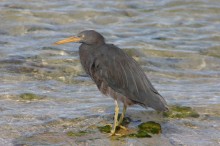Site information:
Wickham Point, a rocky headland at the southern end of the Sunshine Coast, is a fairly reliable site for two of the much sought after wader species in south-east Queensland, Wandering Tattler and Sooty Oystercatcher. This headland lies between Kings Beach and Shelly Beach and is best accessed from the latter location. Care should be taken when walking on the rocks, as they are very slippery when wet.
This general area is popular for swimming, fishing and other recreational activities and some disturbance to the birds can be expected on weekends. It is therefore advisable to schedule a visit for the middle of the week. On most days, up to six Sooty Oystercatcher can be seen roosting or feeding here. The Wandering Tattler is perfectly camouflaged but a teetering tail or a nervous flight to a safer roost betrays its whereabouts. Up to six of this species have been seen during summer. On very high tides, a walk on the rocks becomes a wade around the headland. It is then that the high tide roosts are close to the walking path and Wandering Tattler and Sooty Oystercatcher are more easily seen.
While at the headland, take time to observe other birds usually seen here. Crested Tern gather on the rocks in quite large numbers (300 +), especially from August to October. White and dark morphs of the Eastern Reef Egret are also commonly seen. White-faced Heron make regular forays onto the rocks and Striated Heron hide in the screw-pine (Pandanus tectorius). Diving terns and the occasional Australasian Gannet can be seen, especially when shoals of fish are close to shore or near Bray’s Rock.
How to get there: From Brisbane, drive north along the Bruce Highway for about 80 km. Take the Caloundra exit and follow Caloundra Road for about 11 km to Kings Beach, continuing past the ANZAC Memorial on the Esplanade until reaching Shelly Beach.
Site coordinates: Lat 26º 48’ 04” S, Long 153º 09’ 01” E.
Amenities/access: The nearest toilet and picnic facilities are located at Shelly Beach. This site is not easily accessible for disabled people because of its rocky nature.
Wader species: Wandering Tattler and Sooty Oystercatcher.
Other species: Eastern Reef Egret and Striated Heron.

